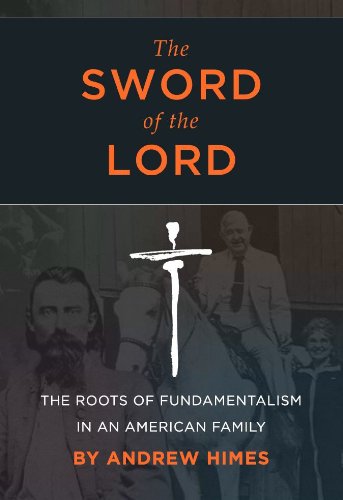
Whenever I start to read a book about personal experiences in Baptist Fundamentalism, I tend to approach it with a certain amount of anxiety. The reason for this is twofold: 1) a fear that it will not affirm my own experience and 2) a hope that the book will treat the subject matter with the correct balance of honesty and respectfulness. As a I read The Sword of the Lord by Andrew Himes, I realized that my initial nervousness was completely unfounded. What I found was a history lesson that was both affirming and accurate but also warm and personal.
The Sword of the Lord is indeed a history book. As one might imagine, it contains the requisite amount of facts, figures and details as the author tells the story of how the ethos of an age and the events of the last two centuries spawned the religious movement that we now know as Baptist Fundamentalism. But through that larger narrative is woven a more personal tale:the story of the Rice family and how its influence shaped the person of John R. Rice (the author’s grandfather) who is, perhaps, more responsible than any other single individual for the shaping of modern fundamentalism.
Opening with a description of the immigration of the Scots-Irish, then continuing to the Civil War, and then through the Southern Reconstruction and into the modern era, Himes tells the tale of fundamentalism in the South by drawing from his own family history and his own personal experiences as a young man. What emerges is a powerful narrative that puts a personal face on events that may otherwise seem distant. From R.A. Torrey and Billy Sunday to the “Texas Tornado” of J. Frank Norris, and then to John R. Rice, Bob Jones Sr., Billy Graham, and Jerry Falwell, the tale of Baptist Fundamentalism gives a detailed analysis of “how we got here” from the roots of historic fundamentalist thought.
Through the book, race plays a large role in Himes’ recounting of Fundamentalist history. Segregationist theology, KKK involvement, blatant racism, and outright hatred were part and parcel of the Southern brand of fundamentalism from which John R. Rice came. His was a movement often more interested in “saving souls” than the practice of justice or mercy. Himes faces this awful truth with unflinching honesty but also is careful not to try to dismiss any individual as being “just a racist” choosing rather to show this evil in the context of the larger picture of both the movement and the individuals in it.
The story concludes as Andrew Himes gives us a look into the last days of John R. Rice as he stood sorrowing at the divisiveness and rancor within the fundamentalist camps and trying to pull warring factions back together into a common cause. Yet, his pleas for unity ultimately fell on deaf ears as the splits and divisions between the Sword of the Lord, Bob Jones University, Jerry Falwell, and Billy Graham created increased isolation and opened the doors to the fragmented fundamentalist circles that we see in the modern day.
The story of fundamentalism is an amazing tale full of blood and thunder, prophets and liars, sinners and saints. But Himes gently reminds us that it is the story of real people as well — people like his grandfather, John R. Rice. He paints the picture of a man who was flawed and fallen but a man who loved people and loved his God in the same imperfect and struggling way that is common to all mankind. It is a personal story both tragic and glorious of Fundamentalism and a family who has journeyed through it.
If you’d like to read it, you can check it out on Amazon.com
I received an advance review copy of this book for free through a generous offer from the author. All of the content of my review, however, is my own. Any disagreements anyone might have with my review will be settled the old-fashioned way: via flame war on the forum
) in conversation with several local religious leaders about the book, and thinking about the fundamentals of faith.

